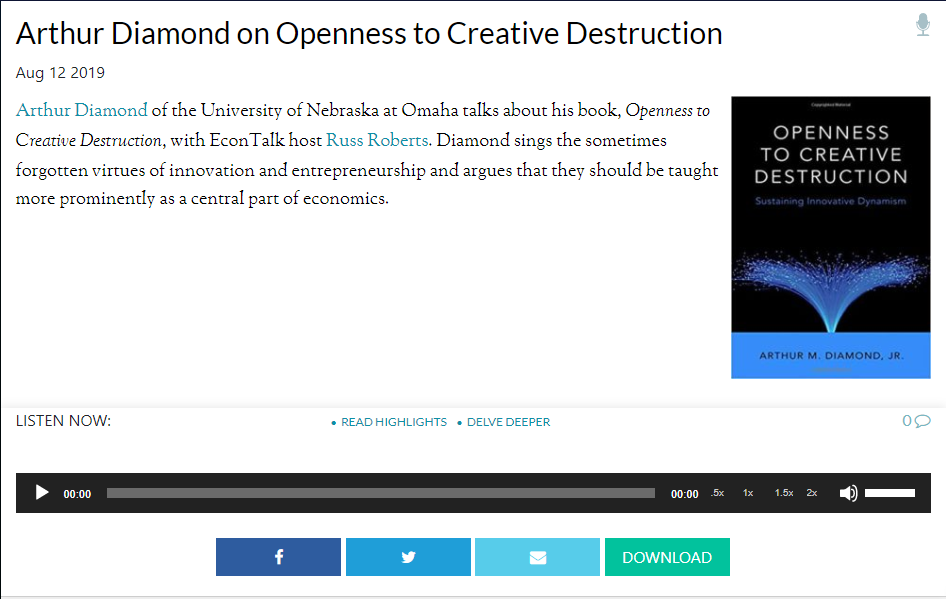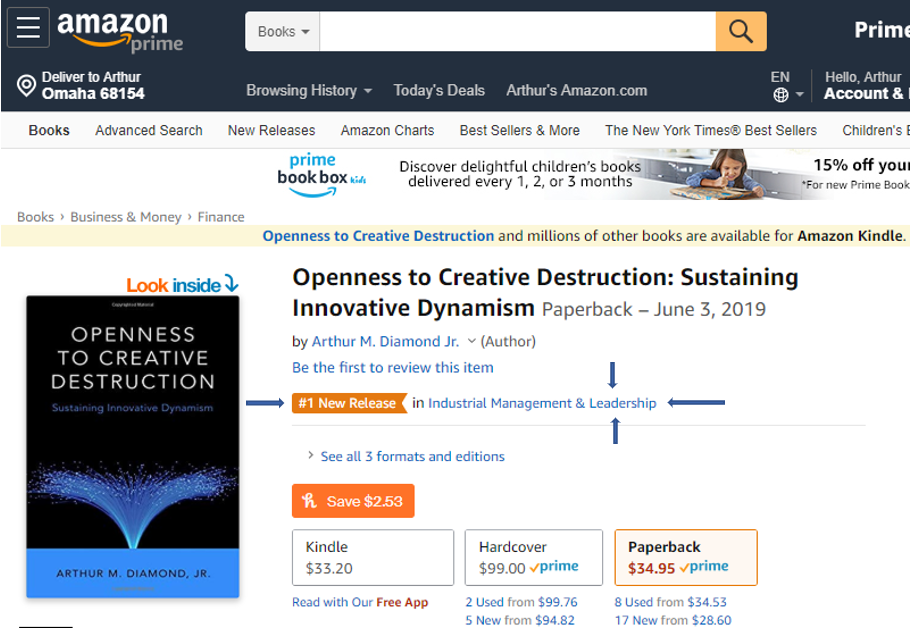A brief YouTube clip on “Outsiders,” excerpted from the EconTalk podcast on Openness to Creative Destruction. The host and interviewer was Russ Roberts of Stanford University’s Hoover Institution. If you click above, the podcast should play right within my blog.
Category: Openness to C. D. Book
YouTube Version of EconTalk Podcast on Openness
The YouTube version of the full hour and 15 minute EconTalk podcast on Openness to Creative Destruction. The host and interviewer was Russ Roberts of Stanford University’s Hoover Institution. If you click above, the podcast should play right within my blog.
EconTalk Podcast on Openness to Creative Destruction
Art Diamond on EconTalk 8/12/19 Podcast with Russ Roberts
Sneak peak at tomorrow's EconTalk episode with Art Diamond on Openness to Creative Destruction: https://t.co/9JMK3W2dWj
— Russell Roberts (@EconTalker) August 12, 2019
The podcast will posted sometime during the morning of Mon., 8/12/19. EconTalk podcasts can be downloaded from (or listened to at) econtalk.org.
Reason Magazine Runs Excerpt from “Openness to Creative Destruction”

Innovative dynamism creates more jobs than it destroys and the new jobs created are usually better jobs than the old jobs destroyed. The Aug./Sept. issue of Reason includes an edited excerpt of this positive account of the labor market from Openness to Creative Destruction. The online version of the article is available now. The print version of the article either is on newsstands now, or will be soon. The citation for the article is:
Diamond, Arthur M., Jr. “How Work Got Good.” Reason (Aug./Sept. 2019): 22-24.
Amazon Names “Openness to Creative Destruction” as “#1 New Release in Industrial Management & Leadership”
Table 7.1 and Table 7.2 Correctly Formatted in Free PDF
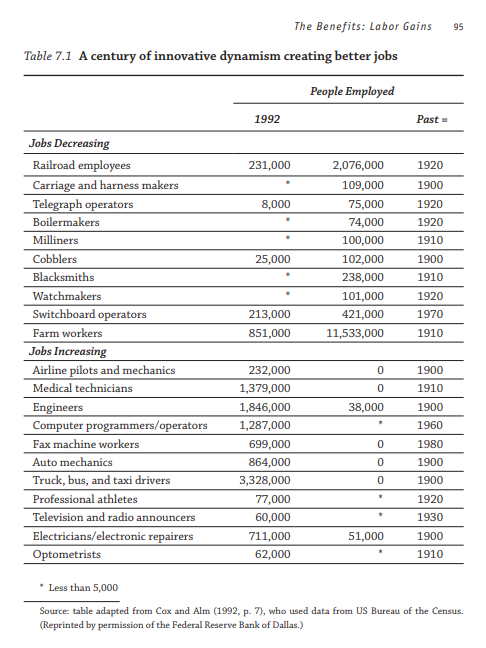
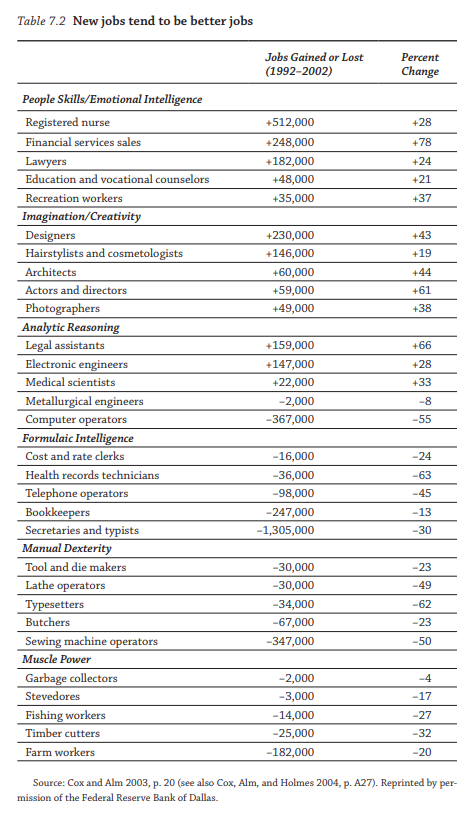
After my last viewing of the page proofs for my Openness to Creative Destruction, formatting errors were introduced by Oxford University Press (OUP) into Table 7.1 and Table 7.2.
A PDF with corrected versions of the tables can be downloaded for free at:
https://www.artdiamond.com/DiamondPDFs/CorrectedPages_94_%20thru_96withHeading.pdf
Openness to Creative Destruction Released Today
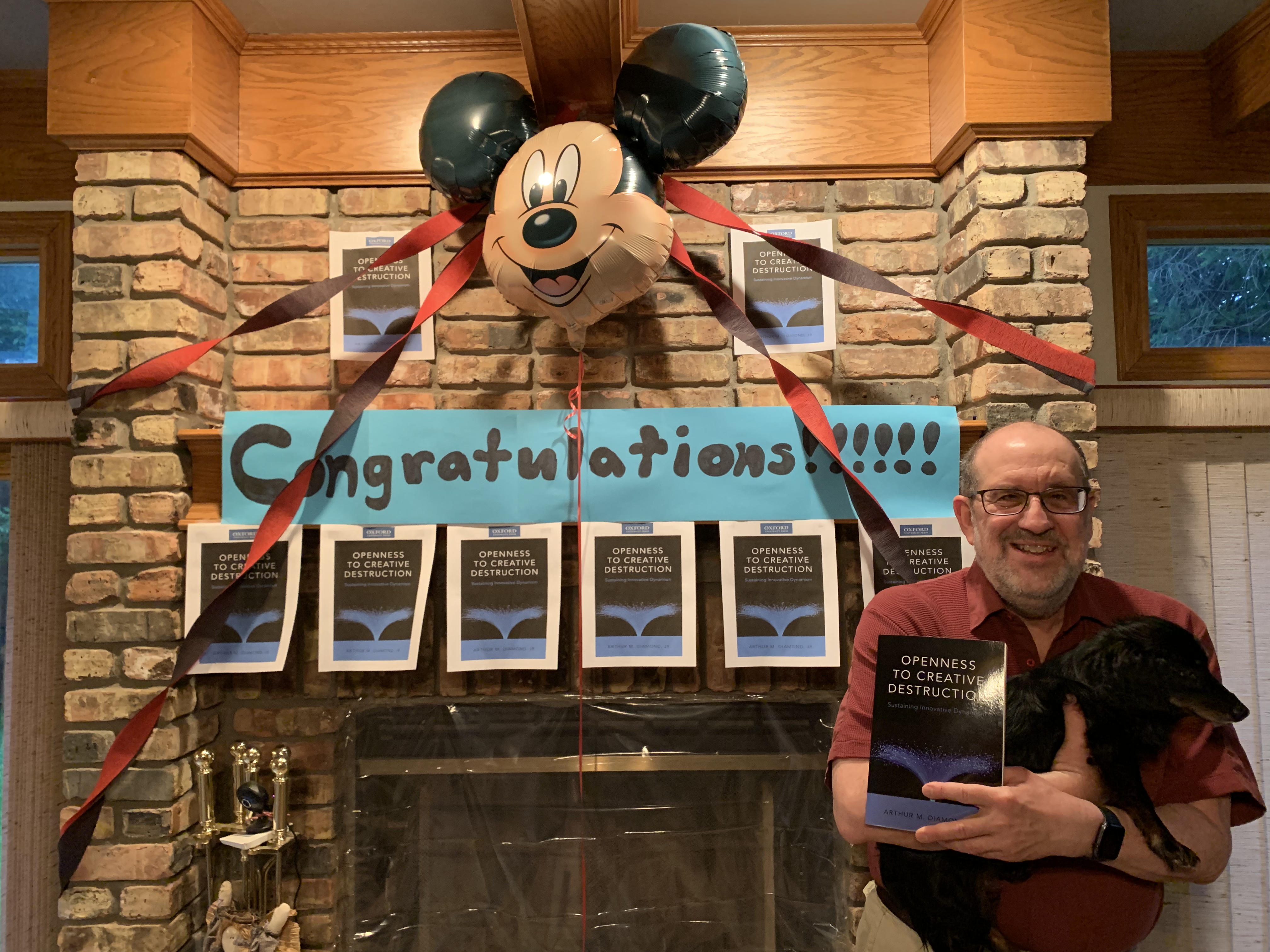
Today, June 3, 2019, is the official release date of my book Openness to Creative Destruction: Sustaining Innovative Dynamism.
A couple of weeks ago I heard a thoughtful presentation by Pete Boettke that contrasted the role of economist as scientist and as savior. He plausibly claimed that one of my mentors, George Stigler, defended the economist as scientist.
But as is true of many of us, Stigler was not always consistent. He sometimes said that whether you are a fireman or an incendiary, you need to know how fire works. And I generalize that if you want to be effective at saving the world, you need to know how the world works. Science as a method of tolerant inquiry, and not as a body of unquestionable doctrine, helps you to know how the world works.
So my immodest hope for Openness is both that it advances the science of economics, and that it helps to save the world.
PS: Openness can be purchased from Oxford University Press for 30% off using the discount code ASFLYQ6.
Vernon Smith Offers More Advance Praise for Openness to Creative Destruction
Adam Smith said that we seek security–more cautious than enterprising–because we suffer more in falling from a better to a worse situation than we ever enjoy in rising from a worse to better. Yet Smith provided opportunity for James Watt, an upstart 22 year-old mechanical genius that was denied him by the local corporations; thus launching a spectacular career of innovation. Others, from Tom Edison to Steve Jobs, followed. Diamond’s book is about our need to nourish and reduce the obstacles to that creative engine; to give freedom to the flower of innovation that we all be enriched.
Vernon Smith, Nobel Prize in Economics, received in 2002.
Vernon Smith’s advance praise is for:
Diamond, Arthur M., Jr. Openness to Creative Destruction: Sustaining Innovative Dynamism. New York: Oxford University Press, forthcoming June 2019.
Oxford Business Card (and Discount Code) for “Openness to Creative Destruction”
The text below is copied and pasted from an Oxford University Press promotional business card. The 30% discount code is: ASFLYQ6
OPENNESS TO CREATIVE DESTRUCTION
ARTHUR M. DIAMOND, JR.
Life improves under the economic system often called “entrepreneurial capitalism” or “creative destruction,” but more accurately called “innovative dynamism.” Openness to Creative Destruction: Sustaining Innovative Dynamism shows how innovation occurs through the efforts of inventors and innovative entrepreneurs, how workers on balance benefit, and how good policies can encourage innovation.
The inventors and innovative entrepreneurs are often cognitively diverse outsiders with the courage and perseverance to see and pursue serendipitous discoveries or slow hunches. Arthur M. Diamond, Jr. shows how economies grow where innovative dynamism through leapfrog competition flourishes, as in the United States from roughly 1830-1930. Consumers vote with their feet for innovative new goods and for process innovations that reduce prices, benefiting ordinary citizens more than the privileged elites. Diamond highlights that because breakthrough inventions are costly and difficult, patents can be fair rewards for invention and can provide funding to enable future inventions. He argues that some fears about adverse effects on labor market are unjustified, since more and better new jobs are created than are destroyed, and that other fears can be mitigated by better policies. The steady growth in regulations, often defended on the basis of the precautionary principle, increases the costs to potential entrepreneurs and thus reduces innovation.
for more information, please visit global.oup.com/academic
US: JUNE 2019 | UK: AUGUST 2019
HARDBACK $99.00 | £64.00 PAPERBACK $34.95 | £22.99
Peter Boettke Offers Advance Praise for Openness to Creative Destruction
Prometheus didn’t ask permission for Zeus to bring fire to the humans. It cost him dearly, as Zeus punished him in a rather vicious manner. But human beings were made infinitely better off with fire. Art Diamond relays this story to us precisely because he wants us to understand the great benefits that entrepreneurial innovation deliver for mankind, and yet how the true innovator is often despised and disrespected by the prevailing orthodox establishment. If Prometheus had to get permission before giving fire to man, then man would have never gotten the benefits of fire. Similarly, if our entrepreneurial innovators had to get permission prior to introducing their innovation, we would still be walking around or perhaps at best riding on the backs of beasts but I doubt we would have seen the benefits of automobiles, let alone planes, and we would very well not have modern conveniences such as indoor plumbing, let alone air travel, cell phones, and the world wide web.
Peter Boettke, Professor of Economics & Philosophy, George Mason University; Director F.A. Hayek Program for Advanced Study in Philosophy, Politics, and Economics at the Mercatus Center.
Boettke’s advance praise is for:
Diamond, Arthur M., Jr. Openness to Creative Destruction: Sustaining Innovative Dynamism. New York: Oxford University Press, forthcoming June 2019.


